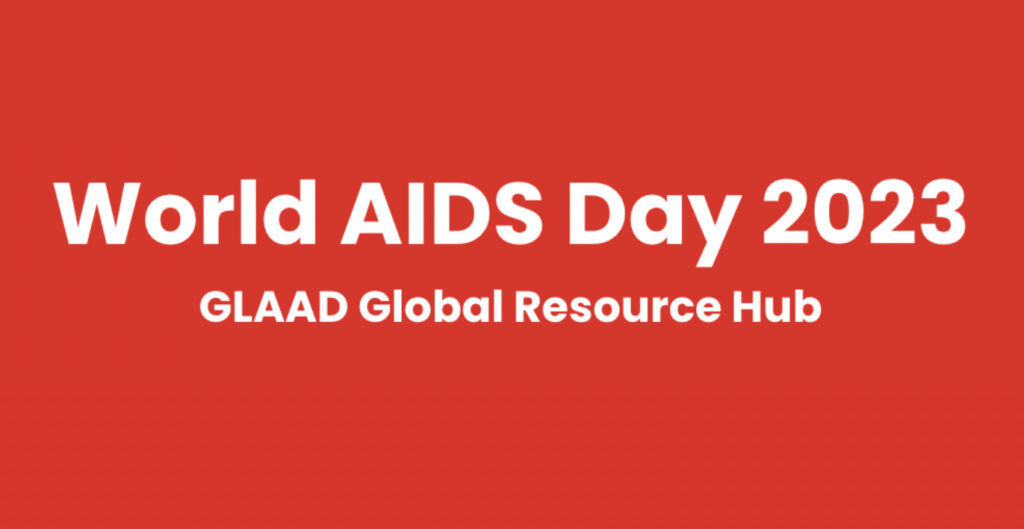GLAAD acknowledges 35th World AIDS Day with new resources
GLAAD, the world’s largest LGBTQ media advocacy organization, marks World AIDS Day this year by sharing the results of its fourth annual State of HIV Stigma Report, a national survey among U.S. adults measuring knowledge and attitudes among Americans about HIV.
Additionally, GLAAD shared entertainment research and analysis to reflect the lack of representation in on-screen storytelling around HIV storylines and characters living with HIV.
GLAAD also launched a World AIDS Day and HIV Global Resource Hub, providing resources and guidelines to journalists, creators and the general public, for cultivating fair and accurate reporting and sharing of experiences related to HIV, treatment & care, and of people living with undetectable HIV.
World AIDS Day has been observed on December 1 every year since 1988 and serves as a reminder of the global struggle to end HIV-related stigma. This year’s theme for World AIDS Day is “World AIDS Day 35: Remember and Commit.” Today, reiterated by new guidance from the World Health Organization, we know Undetectable = Unstransmittable and equals Zero Risk.
GLAAD President & CEO, Sarah Kate Ellis said: “On this 35th observance of World AIDS Day, GLAAD is reenergized in its commitment to achieve a future without HIV. Today, as we remember the millions of lives lost around the world, we also reaffirm the reality that we have all the tools to end this epidemic: game-changing HIV treatment which has extended the lifespan of people living with HIV to near normal expectancy and prevention methods like PrEP (pre-exposure prophylaxis) which reduce the risk of acquiring HIV by 99% when taken as prescribed. GLAAD research also shows that Gen Z, the most LGBTQ generation, is the least knowledgeable about HIV compared to Gen X, driving home how meaningful visibility and representation of HIV-inclusive characters and storylines are needed more than ever. GLAAD remains steadfast in our determination to amplify accurate and inclusive information about HIV to erase HIV stigma. Ending HIV should be every generation’s lasting achievement.”
In partnership with the Gilead COMPASS Initiative, the findings of GLAAD’s 2023 State of HIV Stigma Report tracked progress against HIV stigma, transmission and prevention of HIV, and attitudes and knowledge of people living with HIV in the United States. The report also showed continued progress in important areas of visibility and awareness, including rising knowledge that medications exist to prevent HIV and treat HIV to the point of an undetectable and, therefore, untransmittable HIV status (U=U).
Key Findings:
- Nearly 90% of Americans believe there is still a stigma around HIV.
- 85% of Americans believe HIV prevention should be taught in schools.
- 80% of Americans agree with criminalizing non-disclosure HIV status, which further stigmatizes people living with HIV.
- 65% of Americans reportedly agree that everyone should be tested for HIV in their lifetime, a decrease from the reported 70% who agreed in 2022.
- Over 60% of Gen X’ers say they are knowledgeable about HIV, compared to 34% of Gen Z adults say the same.
- 49% of American feel they are knowledgeable about HIV.
- 37% of Americans inaccurately believe HIV mostly impacts LGBTQ people
- This figure is up from 33% a year ago.
- 32% of Americans report feeling discomfort interacting with a co-worker living with HIV, an increase from the reported 29% who experienced discomfort in 2022.
See, Share and Download the Report HERE.
THE STATE OF HIV REPRESENTATION ON-SCREEN
Television and film are the largest platforms and vehicles for seeing stories about people living with HIV over other forms of entertainment and media like advertisements, digital/social media, and print. GLAAD’s 2023 State of HIV Stigma Report found just under 35% of Americans say they’ve seen stories about people living with HIV in the last year, up 4% from the previous year. Despite this slight increase in visibility, the data clearly punctuates the need to fill this representation gap, with supermajorities of Americans reporting not having seen stories about people living with HIV in the media at all.
GLAAD’s 2023 Studio Responsibility Index, which tracks the quantity, quality, and diversity of LGBTQ characters in theatrical film slates from major studios, found out of 350 films included studied, only one character in one film was portrayed as living with HIV.
Across television, GLAAD’s 2022 Where We Are in TV Report, which assesses and analyzes the number of LGBTQ regular and recurring characters across television networks, revealed that of the 596 LGBTQ characters found across broadcast, cable and streaming scripted television from the 22-23 TV season, only eight characters (1.3%) were counted as living with HIV. None of these characters will return.
LGBTQ stories told through film and TV have a powerful and inextricable link to culture-change, key to breaking stigma and stereotypes around HIV and people living with undetectable HIV. Despite progress and growth in LGBTQ representation in film and TV, the studio-prolonged strikes this year in Hollywood will have immediate effects on the prospect of future visibility of key storylines and characters, including but notwithstanding projects becoming stalled or canceled, hindering progress and growth in this arena. With more people than ever now empowered to live authentically and openly, the cost of lost progress in LGBTQ representation on-screen means erasure.






